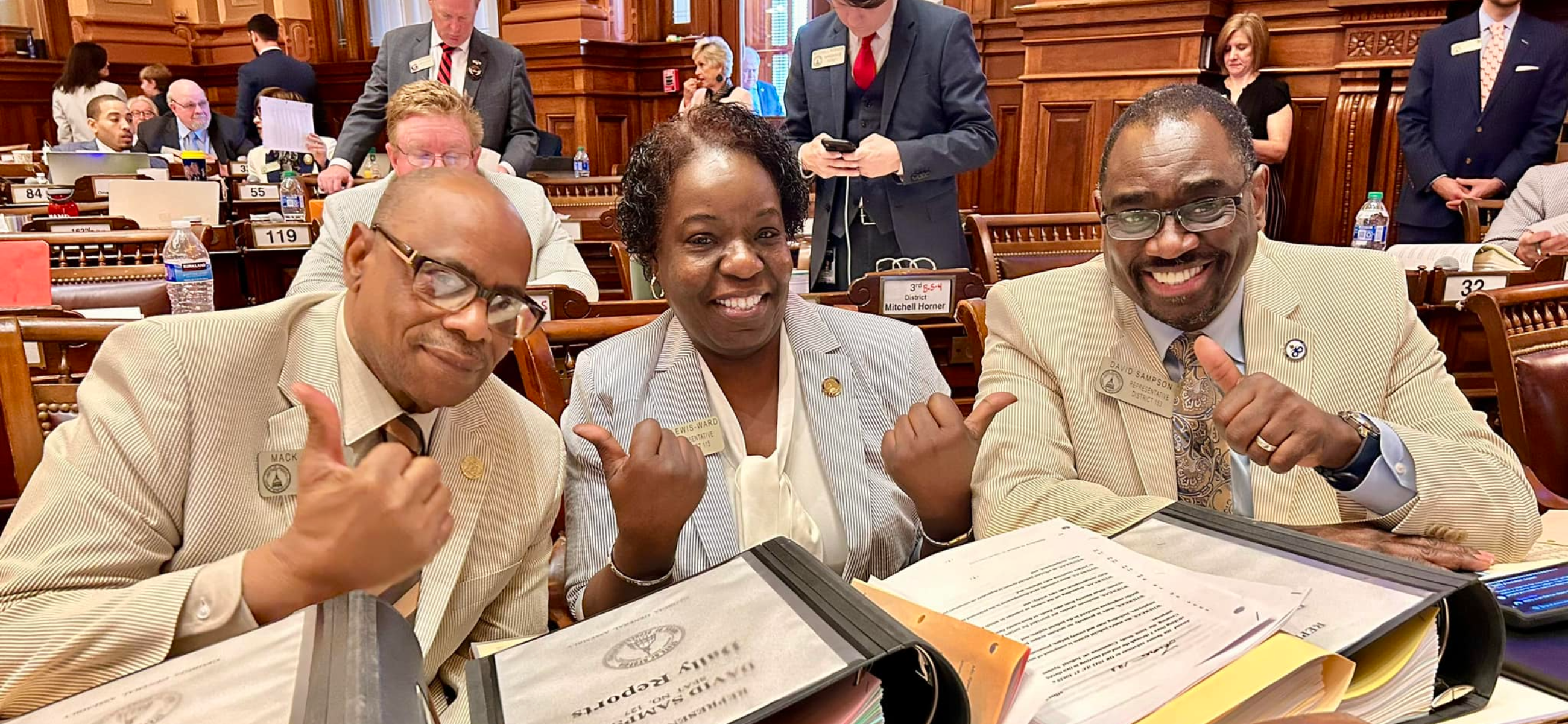Stay ahead of the curve as a political insider with deep policy analysis, daily briefings and policy-shaping tools.
Request a DemoSession nears end: Final push on health care, other critical bills

Reps. Mack Jackson, left, Regina Lewis-Ward and David Sampson. (Credit: Rep. Regina Lewis-Ward)
ATLANTA — The 157th General Assembly made its mark this year. It passed measures to ease regulations governing expansion of hospitals, provide private school vouchers for students in low-performing public school districts and crack down on rogue prosecutors.
On Thursday, the final day of the 2024 legislative session, both chambers churned out a few dozen bills destined for the governor’s desk, including legislation to increase penalties for sex offenders, secure elections and monitor students’ social media activity.
Before the day is done, they will reckon with bills to legalize sports betting and penalize cities that ignore immigration laws.
Gov. Brian Kemp recapped the last three months of legislative work in a quick speech he made to both chambers.
“We put more money towards mental health services than ever before. We’ve made meaningful investments in infrastructure. We’ve taken the first meaningful steps on tort reform in decades,” Kemp said Thursday night.

A bill to define antisemitism, hotly debated on Sine Die last year, generated just as much heat early in this year’s session before passing.
National angst over immigration issues prompted Republicans to pass bills banning foreigners from buying land and from donating to political campaigns. The February death of nursing student Laken Riley, who was allegedly killed by a Venezuelan man who had entered the U.S. illegally, gave new life to immigration-related legislation this session.
In a similar vein, House Bill 1105 would require law enforcement to track and detain undocumented immigrants and to report their status to federal immigration officials.
House Bill 301 would allow Georgia residents to sue law enforcement agencies and local governments that act as sanctuary cities for undocumented immigrants and who fail to enforce state law. If a judge agrees, the state would cut off state and federal aid, except for a short list of essential services. HB 1105 and HB 301 were both amended in the Senate and are expected to see final passage in the House.
Budget takes center stage on final day
Among the biggest issues debated in the final days was the fiscal year 2025 budget.
Key components of the $36.1 billion fiscal year 2025 budget proposed by Gov. Brian Kemp were approved by the House and Senate, whose budget writers continued to negotiate over a few expenditures well into Thursday afternoon.
The 2025 budget makes big new investments in education, including $2,500 raises for K-12 and pre-K teachers, and $210 million in new funding for student transportation. Pre-K class sizes will be reduced to 20 from 22 students using $9.5 million in Georgia Lottery education funds. (Pre-K education will also be infused with lottery revenue from coin-operated amusement machines through House Bill 353, a bill passed this week that calls for $50 million to $100 million in lottery reserves to be used annually for pre-K.)
Higher education will get a boost with $91 million for dual enrollment programs and $66 million to restore funds for teaching programs at smaller colleges, a line item vetoed by Kemp last year.
Most state workers will get 4% pay raises, while law enforcement officers, corrections officers and people in high-turnover positions such as child welfare case workers will get $3,000 more. Behavioral health providers will also see pay rate increases.
The budget includes new funds to expand rural workforce housing, domestic violence shelters, skilled nursing centers, and to provide stable housing and services to homeless persons. State court judges will get raises, as will district attorneys, public defenders, and scientists and technicians at the Georgia Bureau of Investigation.
As always, the state will invest heavily in transportation, spending $2.4 billion on projects including roads, bridges and electric vehicle infrastructure.
Tax breaks equal tax relief
Two bills to provide modest tax relief to both individuals and businesses passed last week. House Bill 1015 cuts the state income tax for individuals to 5.39% from 5.49%, retroactive to Jan. 1. Those earning $58,000 would save about $34 at that rate. House Bill 1023 would decrease the corporate income tax rate to match that of individuals.
Still on tap is House Bill 1019, a bill to lower the assessed value of residential properties and to increase the homestead exemption on owner-occupied homes, was amended by the Senate to raise the exemption to $10,000 from $2,000, a bigger jump than the $4,000 exemption proposed by the House. If passed, it will appear on the November ballot as a referendum for voters.
New provisions for the film tax credit, an interactive gaming tax credit and an affordable housing tax credit were rolled into an amendment to Senate Bill 349.
The bill offers film production companies a 20% tax credit and 10% additional credit to those who meet criteria, including using crew members who are local residents, spending at least $30 million in Georgia, filming at least half of their productions in underserved areas of the state and using local studios and sound stages. The total amount of film credits cannot exceed 2.5% of the total state budget.
The affordable housing tax credit prioritizes housing projects located in rural areas, that reserve a majority of units for seniors and people with disabilities, veterans and first responders; provide access to transportation; and are owned by a housing authority.
Here’s a look at other legislation that did well this session:
Housing. The Legislature passed the Safe at Home Act, which guarantees that rental units are fit for human habitation and also provides other tenant protections.
Lawmakers also passed House Bill 220, which requires community-governed associations to notify in writing a home or condo owner of a covenant breach — such as painting their house a color not approved by the association, and give them time to fix it before taking legal action. It lets homeowners vote in their community-governed associations even if they owe an HOA fee. It also ensures HOA meetings and elections are held at least once a year as long as 5% of the owners ask for it. The Senate created a study committee to delve further into issues involving community-governed associations such as homeowners’ associations.
House Bill 1410 would create a stable housing accountability program to provide voluntary and immediate housing to homeless people for up to 18 months while helping them find permanent housing and providing other wraparound services. It also amends who appoints members to the State Trust Fund for the Homeless Commission.
Health care. After several years of trying, the House and Senate reached a compromise bill involving regulations governing where and if hospitals should be built or expanded in Georgia, which has seen nine rural hospitals close since 2010. The Legislature also passed bills to pay back the student loans of mental health professionals and addiction specialists who serve youth and work in underserved areas of the state.
Law enforcement. Besides healthy raises for law enforcement officers across several agencies, the Legislature approved bills to increase penalties for many crimes, including those related to drug and sex trafficking. Concerned over the national fentanyl crisis, lawmakers passed a bill that goes after those who make or sell fentanyl and charges them with a felony offense of aggravated involuntary manslaughter if their distribution results in someone’s death.
The Legislature also voted to add 20 misdemeanor charges, such as shoplifting, criminal trespass and forgery, to a list of offenses no longer eligible for cash bail after a second charge.
Education. HB 282, a bill on career-readiness education for sixth to 12th graders, passed but not before the Senate amended the bill with provisions that included panic buttons for teachers.
Late-breaking culture wars
A bill originally meant to provide mental health resources to high school athletes became a touchstone on culture wars in the Legislature. The Senate turned House Bill 1104 into a bill banning transgender youth from participating in girls’ sports and from using multi-occupancy school bathrooms, and requiring schools to tell parents what books their children check out from school libraries. The House is expected to take it up today.
In another move, House Bill 1170 started out as a bill to provide opioid drug overdose kits in schools and public buildings but was changed in the Senate to ban the use of puberty-blocking drugs by transgender minors. It passed by substitute 32-19. Awaiting House action.
Medicaid expansion fails
Efforts to expand Medicaid to millions more Georgians hit highs and lows through the session but finally died earlier this month.
Senate Democrats made a last-ditch appeal to a Republican-led Senate committee to expand Medicaid, but after a 7-7 tie vote, the committee chair killed the measure in favor of giving Kemp’s Pathways program more time to catch on. The Democrats’ proposal, modeled after Arkansas’ Medicaid waiver plan, would have let state officials seek a federal waiver so Georgia could purchase private health insurance plans for people who are above the poverty line but unable to afford insurance through the Affordable Care Act.
Have questions or comments? Contact Jill Jordan Sieder on X @journalistajill or at [email protected] and Tammy Joyner on X @lvjoyner or at [email protected].
And subscribe to State Affairs so you do not miss an update.
X @StateAffairsGA
Instagram@StateAffairsGA
Facebook @StateAffairsGA
LinkedIn @StateAffairs
Professionals still face licensing delays amid state’s transition to online system
The Gist Georgia’s professionals and business owners are still struggling to obtain professional licenses in a timely manner. As the Secretary of State’s Office rolls out its new Georgia Online Application Licensing System to expedite the process, the efficiency of this new process is being put to the test. What’s Happening Thursday morning at the …
Controversy over AP African American Studies class grows
Rashad Brown has been teaching Advanced Placement African American Studies at Atlanta’s Maynard Jackson High School for three years. He’ll continue to do so — even though the state’s top education official removed it from the list of state-funded course offerings for the upcoming school year. While Brown prepares to start teaching his class on …
Students, teachers, lawmakers blast decision to end AP African American history classes
ATLANTA — A coalition of lawmakers, civil rights leaders, clergy, educators and students Wednesday called on the state’s education czar to rescind his decision to drop an advanced placement African American studies class from the state’s curriculum for the upcoming school year. “This decision is the latest attack in a long-running GOP assault on Georgia’s …
Kamala Harris’ presidential bid reinvigorates Georgia Democrats
Georgia Democrats have gained new momentum heading into the November election, propelled by President Joe Biden’s decision to bow out of his reelection bid and hand the reins to Vice President Kamala Harris. The historic decision, announced Sunday, is expected to prove pivotal in the national and state political arenas and breathe new life and …



